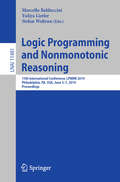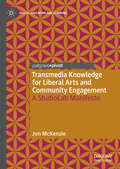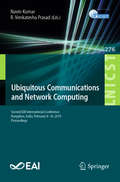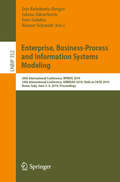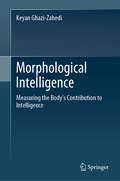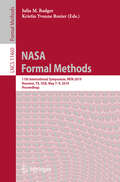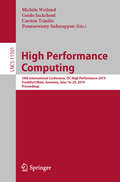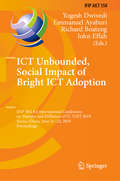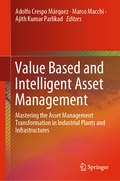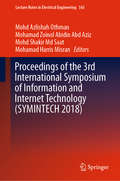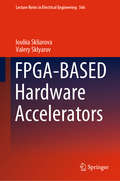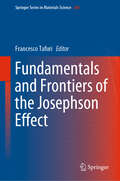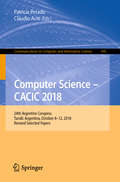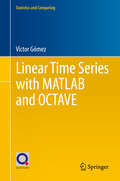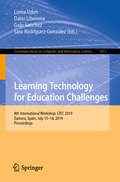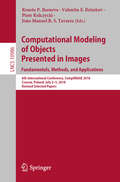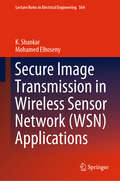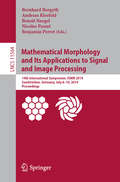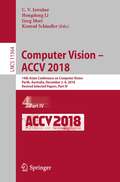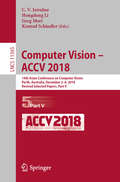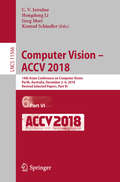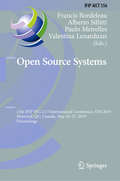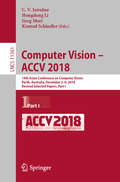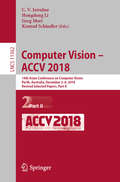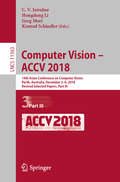- Table View
- List View
Logic Programming and Nonmonotonic Reasoning: 15th International Conference, LPNMR 2019, Philadelphia, PA, USA, June 3-7, 2019, Proceedings (Lecture Notes in Computer Science #11481)
by Marcello Balduccini Yuliya Lierler Stefan WoltranThis book constitutes the refereed proceedings of the 15th International Conference on Logic Programming and Nonmonotonic Reasoning, LPNMR 2019, held in Philadelphia, PA, USA, in June 2019.The 22 full papers and 3 short papers presented in this volume were carefully reviewed and selected from a total of 39 submissions. The papers were organized in topical sections named: applications; argumentation; foundations and complexity; knowledge representation and reasoning; and systems.
Transmedia Knowledge for Liberal Arts and Community Engagement: A StudioLab Manifesto (Digital Education and Learning)
by Jon McKenzieThis book sets forth a pedagogy for renewing the liberal arts by combining critical thinking, media activism, and design thinking. Using the StudioLab approach, the author seeks to democratize the social and technical practices of digital culture just as nineteenth century education sought to democratize literacy. This production of transmedia knowledge—from texts and videos to comics and installations—moves students between seminar, studio, lab, and field activities. The book also wrestles with the figure of Plato and the very medium of knowledge to re-envision higher education in contemporary societies, issuing a call for community engagement as a form of collective thought-action.
Ubiquitous Communications and Network Computing: Second EAI International Conference, Bangalore, India, February 8–10, 2019, Proceedings (Lecture Notes of the Institute for Computer Sciences, Social Informatics and Telecommunications Engineering #276)
by Navin Kumar R. Venkatesha PrasadThis book constitutes the refereed proceedings of the Second International Conference on Ubiquitous Communications and Network Computing, UBICNET 2019, held in Bangalore, India, in February 2019. The 19 full papers were selected from 52 submissions and are basically arranged in different sessions on security and energy efficient computing, software defined networks, cloud computing and internet of things applications, and the advanced communication systems and networks.
Enterprise, Business-Process and Information Systems Modeling: 20th International Conference, BPMDS 2019, 24th International Conference, EMMSAD 2019, Held at CAiSE 2019, Rome, Italy, June 3–4, 2019, Proceedings (Lecture Notes in Business Information Processing #352)
by Iris Reinhartz-Berger Jelena Zdravkovic Jens Gulden Rainer SchmidtThis book constitutes the proceedings of two events held at the CAiSE conference and relating to the areas of enterprise, business process and information systems modeling: The 20th International Conference on Business Process Modeling, Development and Support, BPMDS 2019, and the 24th International Conference on Evaluation and Modeling Methods for Systems Analysis and Development, EMMSAD 2019. The conferences took place in Rome, Italy, in June 2019. The 7 full and 2 short papers accepted for BPMDS were carefully reviewed and selected from a total of 20 submissions; for EMMSAD 15 full papers were accepted from 38 submissions. The papers were organized in topical sections named as follows: BPMDS: large and complex business process modeling and development; execution and understandability of declarative process models; novel approaches in enterprise modeling; transformative business process modeling, development, and support. EMMSAD: foundations of modeling and method engineering; enterprise process and capability modeling; information systems and requirements modeling; domain-specific and ontology modeling; and evaluation of modeling approaches.
Morphological Intelligence: Measuring the Body’s Contribution to Intelligence
by Keyan Ghazi-ZahediIntelligence results from the interaction of the brain, body and environment. The question addressed in this book is, can we measure the contribution of the body and its' interaction with the environment? To answer this, we first present a comprehensive overview of the various ways in which a body reduces the amount of computation that the brain has to perform to solve a task. This chapter will broaden your understanding of how important inconspicuously appearing physical processes and physical properties of the body are with respect to our cognitive abilities. This form of contribution to intelligence is called Morphological Intelligence. The main contribution of this book to the field is a detailed discussion of how Morphological Intelligence can be measured from observations alone. The required mathematical framework is provided so that readers unfamiliar with information theory will be able to understand and apply the measures. Case studies from biomechanics and soft robotics illustrate how the presented quantifications can, for example, be used to measure the contribution of muscle physics to jumping and optimise the shape of a soft robotic hand. To summarise, this monograph presents various examples of how the physical properties of the body and the body’s interaction with the environment contribute to intelligence. Furthermore, it treats theoretical and practical aspects of Morphological Intelligence and demonstrates the value in two case studies.
NASA Formal Methods: 11th International Symposium, NFM 2019, Houston, TX, USA, May 7–9, 2019, Proceedings (Lecture Notes in Computer Science #11460)
by Julia M. Badger Kristin Yvonne RozierThis book constitutes the proceedings of the 11th International Symposium on NASA Formal Methods, NFM 2019, held in Houston, TX, USA, in May 2019. The 20 full and 8 short papers presented in this volume were carefully reviewed and selected from 102 submissions. The papers focus on formal verification, including theorem proving, model checking, and static analysis; advances in automated theorem proving including SAT and SMT solving; use of formal methods in software and system testing; run-time verification; techniques and algorithms for scaling formal methods, such as abstraction and symbolic methods, compositional techniques, as well as parallel and/or distributed techniques; code generation from formally verified models; safety cases and system safety; formal approaches to fault tolerance; theoretical advances and empirical evaluations of formal methods techniques for safety-critical systems, including hybrid and embedded systems; formal methods in systems engineering and model-based development; correct-by-design controller synthesis; formal assurance methods to handle adaptive systems.
High Performance Computing: 34th International Conference, ISC High Performance 2019, Frankfurt/Main, Germany, June 16–20, 2019, Proceedings (Lecture Notes in Computer Science #11501)
by Michèle Weiland Guido Juckeland Carsten Trinitis Ponnuswamy SadayappanThis book constitutes the refereed proceedings of the 34th International Conference on High Performance Computing, ISC High Performance 2019, held in Frankfurt/Main, Germany, in June 2019.The 17 revised full papers presented were carefully reviewed and selected from 70 submissions. The papers cover a broad range of topics such as next-generation high performance components; exascale systems; extreme-scale applications; HPC and advanced environmental engineering projects; parallel ray tracing - visualization at its best; blockchain technology and cryptocurrency; parallel processing in life science; quantum computers/computing; what's new with cloud computing for HPC; parallel programming models for extreme-scale computing; workflow management; machine learning and big data analytics; and deep learning and HPC.
ICT Unbounded, Social Impact of Bright ICT Adoption: IFIP WG 8.6 International Conference on Transfer and Diffusion of IT, TDIT 2019, Accra, Ghana, June 21–22, 2019, Proceedings (IFIP Advances in Information and Communication Technology #558)
by Yogesh Dwivedi Emmanuel Ayaburi Richard Boateng John EffahThis book constitutes the refereed proceedings of the IFIP WG 8.6 International Working Conference "ICT Unbounded, Social Impact of Bright ICT Adoption" on Transfer and Diffusion of IT, TDIT 2019, held in Accra, Ghana, in June 2019. The 30 revised full papers and 4 short papers presented were carefully reviewed and selected from 72 submissions. The papers focus on Bright Information and Communication Technology, a concept that entails the development of relevant technologies, business models, public policies, social norms, international agreements, metrics of measuring national progress and preventing undesirable activities on the Internet. They are organized in the following topical sections: technology adoption, diffusion and ubiquitous computing; big data and business intellligence; smart cities; and security, privacy, ethics and misinformation.
Value Based and Intelligent Asset Management: Mastering the Asset Management Transformation in Industrial Plants and Infrastructures
by Adolfo Crespo Márquez Marco Macchi Ajith Kumar ParlikadThe fundamental motivation of this book is to contribute to the future advancement of Asset Management in the context of industrial plants and infrastructures. The book aims to foster a future perspective that takes advantage of value-based and intelligent asset management in order to make a step forward with respect to the evolution observed nowadays. Indeed, the current understanding of asset management is primarily supported by well-known standards. Nonetheless, asset management is still a young discipline and the knowledge developed by industry and academia is not set in stone yet. Furthermore, current trends in new organizational concepts and technologies lead to an evolutionary path in the field. Therefore, this book aims to discuss this evolutionary path, starting first of all from the consolidated theory, then moving forward to discuss: • The strategic understanding of value-based asset management in a company; • An operational definition of value, as a concept on the background of value-based asset management; • The identification of intelligent asset management, with the aim to frame a set of “tools” recommended to support the asset-related decision-making process over the asset lifecycle; • The emergence of new technologies such as cyber physical systems and digital twins, and the implications of this on asset management.
Proceedings of the 3rd International Symposium of Information and Internet Technology (Lecture Notes in Electrical Engineering #565)
by Mohd Azlishah Othman Mohamad Zoinol Abd Aziz Mohd Shakir Md Saat Mohamad Harris MisranThis book gathers the proceedings of a symposium on the role of Internet technologies and how they can transform and improve people’s lives. The Internet is essentially a massive database where all types of information can be shared and transmitted. This can be done passively in the form of non-interactive websites and blogs; or it can be done actively in the form of file sharing and document up- and downloading. Thanks to these technologies, a wealth of information is now available to anyone who can access the Internet. Moreover, Internet technologies are constantly improving: growing faster, offering more diverse information, and supporting processes that would have been impossible in the past. As a result, they have changed, and will continue to change, the way that the world does business and how people interact in their day-to-day lives. In conclusion, the symposium and these proceedings provide a valuable opportunity for leading researchers, engineers and professionals around the globe to discuss the latest advances that are helping the world move forward. They also facilitate the exchange of new ideas in the fields of communication technology to create a dialogue between these groups concerning the latest innovations, trends and concerns, practical challenges and potential solutions in the field of Internet technologies.
FPGA-BASED Hardware Accelerators (Lecture Notes in Electrical Engineering #566)
by Iouliia Skliarova Valery SklyarovThis book suggests and describes a number of fast parallel circuits for data/vector processing using FPGA-based hardware accelerators. Three primary areas are covered: searching, sorting, and counting in combinational and iterative networks. These include the application of traditional structures that rely on comparators/swappers as well as alternative networks with a variety of core elements such as adders, logical gates, and look-up tables. The iterative technique discussed in the book enables the sequential reuse of relatively large combinational blocks that execute many parallel operations with small propagation delays. For each type of network discussed, the main focus is on the step-by-step development of the architectures proposed from initial concepts to synthesizable hardware description language specifications. Each type of network is taken through several stages, including modeling the desired functionality in software, the retrieval and automatic conversion of key functions, leading to specifications for optimized hardware modules. The resulting specifications are then synthesized, implemented, and tested in FPGAs using commercial design environments and prototyping boards. The methods proposed can be used in a range of data processing applications, including traditional sorting, the extraction of maximum and minimum subsets from large data sets, communication-time data processing, finding frequently occurring items in a set, and Hamming weight/distance counters/comparators. The book is intended to be a valuable support material for university and industrial engineering courses that involve FPGA-based circuit and system design.
Fundamentals and Frontiers of the Josephson Effect (Springer Series in Materials Science #286)
by Francesco TafuriThis book provides a comprehensive and up-to-date description of the Josephson effect, a topic of never-ending interest in both fundamental and applied physics. In this volume, world-renowned experts present the unique aspects of the physics of the Josephson effect, resulting from the use of new materials, of hybrid architectures and from the possibility of realizing nanoscale junctions. These new experimental capabilities lead to systems where novel coherent phenomena and transport processes emerge. All this is of great relevance and impact, especially when combined with the didactic approach of the book. The reader will benefit from a general and modern view of coherent phenomena in weakly-coupled superconductors on a macroscopic scale. Topics that have been only recently discussed in specialized papers and in short reviews are described here for the first time and organized in a general framework. An important section of the book is also devoted to applications, with focus on long-term, future applications. In addition to a significant number of illustrations, the book includes numerous tables for comparative studies on technical aspects.
Computer Science – CACIC 2018: 24th Argentine Congress, Tandil, Argentina, October 8–12, 2018, Revised Selected Papers (Communications in Computer and Information Science #995)
by Patricia Pesado Claudio AcitiThis book constitutes revised selected papers from the 24th Argentine Congress on Computer Science, CACIC 2018, held in Tandil, Argentina, in October 2018. The 26 papers presented in this volume were carefully reviewed and selected from a total of 155 submissions. They were organized in topical sections named: Agents and Systems; Distributed and Parallel Processing; Technology Applied to Education; Graphic Computation, Images and Visualization; Software Engineering; Databases and Data Mining; Hardware Architectures, Networks, and Operating Systems; Innovation in Software Systems; Signal Processing and Real-Time Systems; Computer Security; Innovation in Computer Science Education; and Digital Governance and Smart Cities.
Linear Time Series with MATLAB and OCTAVE (Statistics and Computing)
by Víctor GómezThis book presents an introduction to linear univariate and multivariate time series analysis, providing brief theoretical insights into each topic, and from the beginning illustrating the theory with software examples. As such, it quickly introduces readers to the peculiarities of each subject from both theoretical and the practical points of view. It also includes numerous examples and real-world applications that demonstrate how to handle different types of time series data. The associated software package, SSMMATLAB, is written in MATLAB and also runs on the free OCTAVE platform. The book focuses on linear time series models using a state space approach, with the Kalman filter and smoother as the main tools for model estimation, prediction and signal extraction. A chapter on state space models describes these tools and provides examples of their use with general state space models. Other topics discussed in the book include ARIMA; and transfer function and structural models; as well as signal extraction using the canonical decomposition in the univariate case, and VAR, VARMA, cointegrated VARMA, VARX, VARMAX, and multivariate structural models in the multivariate case. It also addresses spectral analysis, the use of fixed filters in a model-based approach, and automatic model identification procedures for ARIMA and transfer function models in the presence of outliers, interventions, complex seasonal patterns and other effects like Easter, trading day, etc. This book is intended for both students and researchers in various fields dealing with time series. The software provides numerous automatic procedures to handle common practical situations, but at the same time, readers with programming skills can write their own programs to deal with specific problems. Although the theoretical introduction to each topic is kept to a minimum, readers can consult the companion book ‘Multivariate Time Series With Linear State Space Structure’, by the same author, if they require more details.
Learning Technology for Education Challenges: 8th International Workshop, LTEC 2019, Zamora, Spain, July 15–18, 2019, Proceedings (Communications in Computer and Information Science #1011)
by Lorna Uden Dario Liberona Galo Sanchez Sara Rodríguez-GonzálezThis book constitutes the refereed proceedings of the 8th International Workshop on Learning Technology for Education Challenges, LTEC 2019, held in Zamora, Spain, in July 2019.The 41 revised full papers presented were carefully reviewed and selected from 83 submissions. The papers are organized in the following topical sections: learning technolgies; learning tools and environment; e-learning and MOOCs; learning practices; social media learning tools; machine learning and evaluation support programs. LTEC 2019 examines how these technologies and pedagogical advances can be used to change the way teachers teach and students learn, while giving special emphasis to the pedagogically effective ways we can harness these new technologies in education.
Computational Modeling of Objects Presented in Images. Fundamentals, Methods, and Applications: 6th International Conference, CompIMAGE 2018, Cracow, Poland, July 2–5, 2018, Revised Selected Papers (Lecture Notes in Computer Science #10986)
by Reneta P. Barneva Valentin E. Brimkov Piotr Kulczycki João Manuel TavaresThis book constitutes the refereed post-conference proceedings of the 6th International Symposium on Computational Modeling of Objects Presented in Images, CompIMAGE 2018, held in Cracow, Poland, inJuly 2018.The 16 revised full papers presented in this book were carefully reviewed and selected from 30 submissions. The papers cover the following topics: digital geometry; digital tomography; and methods and applications.
Secure Image Transmission in Wireless Sensor Network (Lecture Notes in Electrical Engineering #564)
by K. Shankar Mohamed ElhosenyThis book offers an essential guide to Wireless Sensor Networks, IoT Security, Image Processing, Secure Information Systems, and Data Encryption. In addition, it introduces students and aspiring practitioners to the subject of destination marketing in a structured manner. It is chiefly intended for researcher students in the areas of Wireless Sensor Networks and Secure Data Communication (including image encryption, and intrusion detection systems), academics at universities and colleges, IT professionals, policymakers and legislators. Given its content, the book can be used as a reference text for both undergraduate and graduate studies, in courses on Wireless Sensor Networks, Secure Image Processing, and Data Encryption applications. The book is written in plain and easy-to-follow language and explains each main concept the first time it appears, helping readers with no prior background in the field. As such, it is a “must-read” guide to the subject matter.
Mathematical Morphology and Its Applications to Signal and Image Processing: 14th International Symposium, ISMM 2019, Saarbrücken, Germany, July 8-10, 2019, Proceedings (Lecture Notes in Computer Science #11564)
by Bernhard Burgeth Andreas Kleefeld Benoît Naegel Nicolas Passat Benjamin PerretThis book contains the refereed proceedings of the 14th International Symposium on Mathematical Morphology, ISMM 2019, held in Saarbrücken, Germany, in July 2019. The 40 revised full papers presented together with one invited talk were carefully reviewed and selected from 54 submissions. The papers are organized in topical sections on Theory, Discrete Topology and Tomography, Trees and Hierarchies, Multivariate Morphology, Computational Morphology, Machine Learning, Segmentation, Applications in Engineering, and Applications in (Bio)medical Imaging.
Computer Vision – ACCV 2018: 14th Asian Conference on Computer Vision, Perth, Australia, December 2–6, 2018, Revised Selected Papers, Part IV (Lecture Notes in Computer Science #11364)
by C. V. Jawahar Hongdong Li Greg Mori Konrad SchindlerThe six volume set LNCS 11361-11366 constitutes the proceedings of the 14th Asian Conference on Computer Vision, ACCV 2018, held in Perth, Australia, in December 2018. The total of 274 contributions was carefully reviewed and selected from 979 submissions during two rounds of reviewing and improvement. The papers focus on motion and tracking, segmentation and grouping, image-based modeling, dep learning, object recognition object recognition, object detection and categorization, vision and language, video analysis and event recognition, face and gesture analysis, statistical methods and learning, performance evaluation, medical image analysis, document analysis, optimization methods, RGBD and depth camera processing, robotic vision, applications of computer vision.
Computer Vision – ACCV 2018: 14th Asian Conference on Computer Vision, Perth, Australia, December 2–6, 2018, Revised Selected Papers, Part V (Lecture Notes in Computer Science #11365)
by C. V. Jawahar Hongdong Li Greg Mori Konrad SchindlerThe six volume set LNCS 11361-11366 constitutes the proceedings of the 14th Asian Conference on Computer Vision, ACCV 2018, held in Perth, Australia, in December 2018. The total of 274 contributions was carefully reviewed and selected from 979 submissions during two rounds of reviewing and improvement. The papers focus on motion and tracking, segmentation and grouping, image-based modeling, dep learning, object recognition object recognition, object detection and categorization, vision and language, video analysis and event recognition, face and gesture analysis, statistical methods and learning, performance evaluation, medical image analysis, document analysis, optimization methods, RGBD and depth camera processing, robotic vision, applications of computer vision.
Computer Vision – ACCV 2018: 14th Asian Conference on Computer Vision, Perth, Australia, December 2–6, 2018, Revised Selected Papers, Part VI (Lecture Notes in Computer Science #11366)
by C. V. Jawahar Hongdong Li Greg Mori Konrad SchindlerThe six volume set LNCS 11361-11366 constitutes the proceedings of the 14th Asian Conference on Computer Vision, ACCV 2018, held in Perth, Australia, in December 2018. The total of 274 contributions was carefully reviewed and selected from 979 submissions during two rounds of reviewing and improvement. The papers focus on motion and tracking, segmentation and grouping, image-based modeling, dep learning, object recognition object recognition, object detection and categorization, vision and language, video analysis and event recognition, face and gesture analysis, statistical methods and learning, performance evaluation, medical image analysis, document analysis, optimization methods, RGBD and depth camera processing, robotic vision, applications of computer vision.
Open Source Systems: 15th IFIP WG 2.13 International Conference, OSS 2019, Montreal, QC, Canada, May 26–27, 2019, Proceedings (IFIP Advances in Information and Communication Technology #556)
by Francis Bordeleau Alberto Sillitti Paulo Meirelles Valentina LenarduzziThis open access book constitutes the refereed proceedings of the 15th IFIP WG 2.13 International Conference on Open Source Systems, OSS 2019, held in Montreal, Quebec, Canada, in May 2019.The 10 revised full papers and 5 short papers presented were carefully reviewed and selected from 35 submissions. The papers cover a wide range of topics in the field of free/libre open source software (FLOSS) and are organized in the following thematic sections: mining OSS data; organizational aspects of FLOSS projects; FLOSS adoption; FLOSS cost and licenses; and FLOSS education and training.
Computer Vision – ACCV 2018: 14th Asian Conference on Computer Vision, Perth, Australia, December 2–6, 2018, Revised Selected Papers, Part I (Lecture Notes in Computer Science #11361)
by C. V. Jawahar Hongdong Li Greg Mori Konrad SchindlerThe six volume set LNCS 11361-11366 constitutes the proceedings of the 14th Asian Conference on Computer Vision, ACCV 2018, held in Perth, Australia, in December 2018. The total of 274 contributions was carefully reviewed and selected from 979 submissions during two rounds of reviewing and improvement. The papers focus on motion and tracking, segmentation and grouping, image-based modeling, dep learning, object recognition object recognition, object detection and categorization, vision and language, video analysis and event recognition, face and gesture analysis, statistical methods and learning, performance evaluation, medical image analysis, document analysis, optimization methods, RGBD and depth camera processing, robotic vision, applications of computer vision.
Computer Vision – ACCV 2018: 14th Asian Conference on Computer Vision, Perth, Australia, December 2–6, 2018, Revised Selected Papers, Part II (Lecture Notes in Computer Science #11362)
by C. V. Jawahar Hongdong Li Greg Mori Konrad SchindlerThe six volume set LNCS 11361-11366 constitutes the proceedings of the 14th Asian Conference on Computer Vision, ACCV 2018, held in Perth, Australia, in December 2018. The total of 274 contributions was carefully reviewed and selected from 979 submissions during two rounds of reviewing and improvement. The papers focus on motion and tracking, segmentation and grouping, image-based modeling, dep learning, object recognition object recognition, object detection and categorization, vision and language, video analysis and event recognition, face and gesture analysis, statistical methods and learning, performance evaluation, medical image analysis, document analysis, optimization methods, RGBD and depth camera processing, robotic vision, applications of computer vision.
Computer Vision – ACCV 2018: 14th Asian Conference on Computer Vision, Perth, Australia, December 2–6, 2018, Revised Selected Papers, Part III (Lecture Notes in Computer Science #11363)
by C. V. Jawahar Hongdong Li Greg Mori Konrad SchindlerThe six volume set LNCS 11361-11366 constitutes the proceedings of the 14th Asian Conference on Computer Vision, ACCV 2018, held in Perth, Australia, in December 2018. The total of 274 contributions was carefully reviewed and selected from 979 submissions during two rounds of reviewing and improvement. The papers focus on motion and tracking, segmentation and grouping, image-based modeling, dep learning, object recognition object recognition, object detection and categorization, vision and language, video analysis and event recognition, face and gesture analysis, statistical methods and learning, performance evaluation, medical image analysis, document analysis, optimization methods, RGBD and depth camera processing, robotic vision, applications of computer vision.
